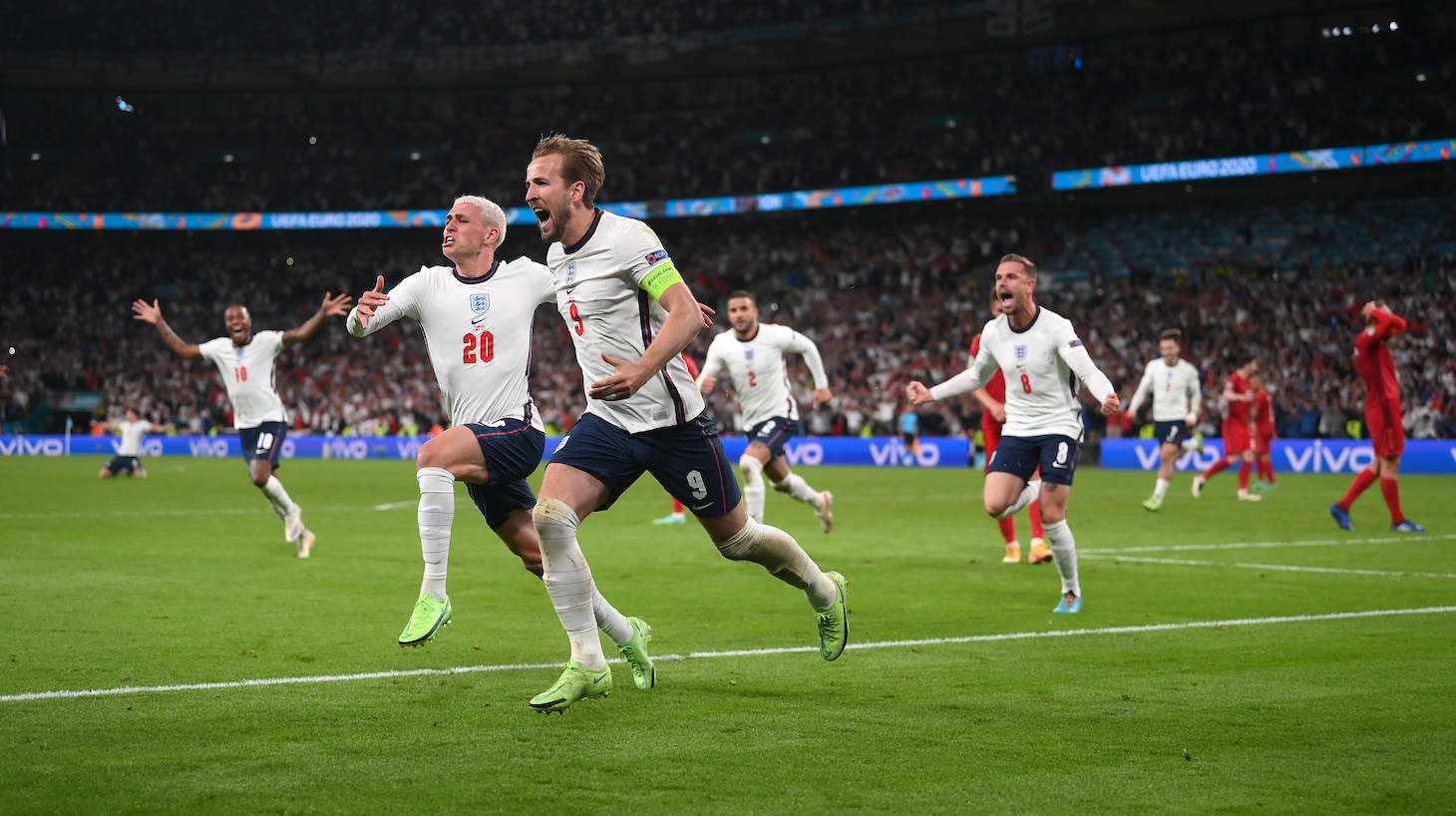At last, the English have made it. After lucking into the more forgiving side of the bracket, England dutifully, though not especially memorably, dispatched each of its opponents and won a spot in the Euros' final. You can say that England earned its trip to the title game, and it would be no shock if they outplay Italy in that match to win their first ever European Championship. But if the Three Lions do go on to win in the same safe, staid fashion that has brought them this far, it will be both more and less than what England deserves.
England, along with France, was one of the two big favorites to win the tournament before it began. Partly that's because England had the chance to play the vast majority of its matches, including both the semifinal and final, at home, but mostly it's due to the country's freakish array of talent. England has become a veritable factory of fantastic young players who embody all the variegated traits and abilities the modern game calls for, including skills not traditionally considered English. It's been clear since the emergence of the likes of Raheem Sterling, Harry Kane, and Dele Alli that England had something of a golden generation on its hands, and the country hasn't stopped churning out elite talent since. After steady improvement over the years—a disappointing but still auspicious round of 16 exit from Euro 2016, an impressive run to the 2018 World Cup semifinals—as the generation has grown, matured, and incorporated even more talent, England entered these Euros perfectly poised to finally attain the success that has long been expected.
In summary, England has been pegged to win or at least seriously challenge for international trophies for years now, came into the Euros with one of the field's strongest squads and highest expectations, and has now journeyed to the final without much suffering or stress along the way. And yet I still have the feeling that if this England does win this final by playing the same way they've been playing throughout the tournament, there will be something vaguely disappointing and dissatisfying about it.
What's strange about this feeling is that I, though for different reasons than some, very much like this England team. As a devout though non-denominational Premier League fan, I've watched with wide eyes the rises of Sterling, Kane, Marcus Rashford, Trent Alexander-Arnold, Phil Foden, Mason Mount, Jack Grealish, Jadon Sancho, Bukayo Saka, and so many other Englishmen who've come in and out of the national team setup over the years. Coming from the league I follow the closest, and with my soccer conversion still relatively new (I wasn't truly hooked on the sport until 2010), I feel a particular affinity for the present crop of English stars. I've tracked many of their careers from their beginnings to this point, and I want the best—which includes the highest possible international success—for all of them.
And that I think is where this feeling of mine comes from: The current version of England, though very good and on the cusp of glory, does not at all seem like the best possible England. The strength of this squad is in its ridiculously talented and deep cadre of creative attacking players. Forget national teams—any club in the world would die to have England's bevy of attackers. Pep Guardiola must have dreams where he imagines himself in charge of this crew. (It's no coincidence the Manchester City manager already coaches two of them, and he's reportedly hot on the trail of two more this very summer.) In that roster there is the raw material for one of the most domineering, entertaining, aggressive, forward-thinking, attack-minded teams in the world, generational talents who could form a generationally important outfit that defines an era's understanding of what a great international side looks like. What Gareth Southgate's England actually is, instead, is safe and staid, solid and unadventurous, good and unremarkable. Should England manage to win the Euros—and England is the slight favorite to do so—the achievement would be special but the method will have been anything but.
The other finalist serves as an instructive contrast. A potential Italian victory actually would stand for something greater than itself in a way an English one probably would not. Italy is that sophisticated, enrapturing, boundary-pushing spectacle that England could be but isn't. Roberto Mancini's Italy is a counter-cultural force that has rejected the country's tradition for defensive-mindedness in favor of radically adventurous and fluid attacking, which captures some of energy of Serie A's quiet revolution in that direction. The team empowers many of its coolest, most unique players—Marco Verratti, Lorenzo Insigne, Leonardo Spinazzola—with a system built around getting them to thrive. Because of all that, if the Italians win, it would feel like they deserved it.
England, meanwhile, plays an intentionally conservative style that reflects nothing so much as Southgate's own pragmatism and cautiousness. England not only doesn't play to its attacking strengths (their nine shots per 90 minutes ranks 20th in the 24-team field), it doesn't try to get the best out of any of the forwards. And of arguably their three very best talents—Sancho, Grealish, and Foden—not one of them is even a regular starter! It is easier to pull for this idealistic Italy that is trying to bring something new to the country and to the sport than it is to root for England, which so far has shown no ambition other than mere winning for winning's sake. Why should football come home to where nothing is new?
Admittedly, this line of thinking puts a lot of importance on intangibles like narrative, aesthetics, and feelings, and not everyone understands the game in that way. Which is totally fine. Most fans probably don't much care about how England wins so long as England wins, and the team's players, coaches, and fans can and should rightly be proud of this run no matter how the tournament ends. But there are more things going on in sports than what appears in an almanac.
Soccer develops in dialectical fashion, where a player or coach or team will come up with some innovative strategy, which will pose new questions the established strategies are not well equipped to handle, until it is widely adopted and becomes the new established strategy, at which point another innovation will come along and start the process all over again. Various things both intentional and random inform the progression of this dialectic—the technology of the time, the cultural preferences of a society, a country's weather patterns, who a national team recently defeated or lost to, etc. etc.—and it is its constantly changing nature that shapes how the game is played and how it is experienced. And the Italian style of play at the Euros is part of that cultural-tactical conversation in a way that England's isn't.
Things like aesthetics aren't as divorced from the concrete happenings on the field as they might seem. Beautiful passages of play or attractive tactical setups are so pleasurable precisely because they are effective. The whole point of a sport like soccer is to draw up a set of strict constraints on movement and interaction and see how players and teams can use their individual and collective athleticism, coordination, reflexes, and ingenuity to overcome those constraints to achieve a common goal. Finding new ways to solve the old problems is why fans follow the game and its players and teams and leagues from year to year instead of just watching the same Maradona highlights for six hours every weekend. Growth and development into the future in light of the past is as much a part of the game's allure as goal tallies and trophy counts.
England could be part of this broader developmental conversation, but it instead is content trying win while standing still. There's nothing necessarily wrong with that, but there could be something more. And as someone who wants to see England win but only if it felt like it really mattered, I'll withhold my support for a potential future England that takes the true possibilities of winning as seriously as the game deserves.






